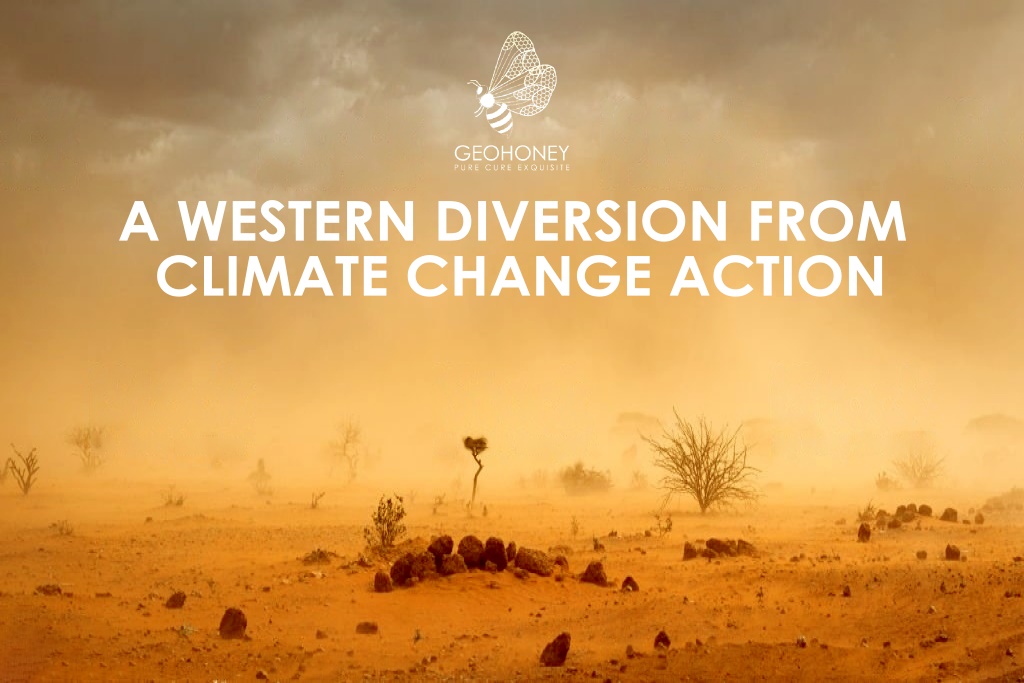- Tokyo: 12:49
- Singapore: 11:49
- Dubai: 07:49
- London: 03:49
- New York: 22:49
A Western Diversion From Climate Change Action

Rising temperatures are endangering life in the Arab world, causing water scarcity in Jordan and deadly heat waves in the Gulf states.
Climate change is a difficult subject with enormous ramifications for the Global South, which should be common knowledge by now. Climate disasters would cost the majority of Small Island Developing States (SIDS) up to 100 percent of their GDP by 2030. Similarly, Africa's 54 countries will bear some of the greatest repercussions of global warming, despite being the least responsible for the crisis, accounting for less than 4% of global greenhouse-gas (GHG) emissions.
Rising temperatures are also endangering life in the Arab continent, with Jordan experiencing water constraint and the Gulf countries experiencing terrible heat waves. The need for significant regional and global reform was one of the primary reasons Egypt hosted last year's United Nations Climate Change Conference (COP27), and the UAE will host this year's meeting. In preparation for COP28, which will take place in Dubai in November and December, the UAE has committed to having open and honest dialogue with everyone to ensure the success of the conference.
The UAE chose Sultan Al Jaber as the COP28 president-designate, building on its strategic determination to promote and invest in renewables, conservation, and climate technologies. Al Jaber is the managing director and group CEO of Abu Dhabi National Oil Company, in addition to being the chairman of Masdar - the global renewable energy company, with its flagship Masdar City housing the International Renewable Energy Agency - and the minister of industry and advanced technology.
Accelerating climate action, addressing the problems of the energy transition, and sustaining global oil demand must all be tackled thoroughly. Recognising this reality, the UAE has appointed someone with substantial expertise in renewable energy projects, as a special envoy for climate change, and in positions responsible for decreasing industrial emissions to monitor the negotiations.
Global warming is a complex problem that necessitates sophisticated solutions involving the knowledge of specialists from a wide range of professions. A small but vocal number of lawmakers and activists in the United States and Europe have questioned why an "oil executive" is organising COP28. Many of these policymakers are adamant about turning climate negotiations into a zero-sum game.
They appear to view the battle against global warming as a political stick to wield, rather than a global imperative requiring close collaboration, by diverting attention away from the task of delivering serious climate solutions and instead focusing on Al Jaber's appointment. Their demand was not motivated by wrongdoing or a lack of dedication to the task, but rather by a desire to score political points at the expense of a global effort to combat climate change while maintaining economic growth.
Legislators should strive to achieve the best possible outcomes for their constituents and children, rather than embracing policies based on political biases without making any meaningful effort to engage. Worse, US and European politicians are urging international intervention in a sovereign decision, the latest in a long history of Western efforts to impose their will on governments in the Global South for domestic political advantage.
Considering Global Climate Policy
Furthermore, the inclination to dictate policy solutions to nations in the Global South, which are frequently the hardest afflicted by climate change and have faced injustice after injustice, including colonisation and resource extraction, is expanding the divide between approaches to global warming. Climate action must be balanced with the need to create economic opportunity for billions of people in emerging economies such as China and India.
Nonetheless, both China and India have made significant investments in climate mitigation and adaptation, with China developing the world's largest capacity for manufacturing and deploying renewables. Since 2017, the two countries have installed more than 40% of the world's new solar and wind capacity each year, making them the global leaders in solar and wind capacity.
Consumption of fossil fuels continues in China and India, as it does globally, but has been reduced from 96 percent to an average of 83 percent of total consumption in both countries. China and India, with nearly three billion people between them, are among the world's largest and fastest-growing economies; their needs cannot be ignored.
The same politicians who are lecturing sovereign states on how to handle climate policy appear to have forgotten that the United States and Europe are responsible for the vast bulk of historic emissions. Rather than intervening in the decision-making processes of countries committed to climate action, they should put pressure on their own governments to meet their pledges.
Currently, the United States and Europe are building their own fossil-fuel infrastructure while failing to contribute significantly to internationally agreed-upon money for climate change mitigation. The UK has announced the opening of its first new coal mine in 30 years, while Germany has resurrected or prolonged the lifetimes of at least 20 coal-fired power plants.
Any debate of the energy transition demands nuance and a true commitment to collaborative action. But that is untenable when certain politicians are more concerned with building a name for themselves with memorable sound bites. The global community has broadly agreed on the importance of reducing GHG emissions. We cannot allow a minority to modify the problem's narrative and, as a result, limit momentum.
The climate catastrophe is real, as is the political theatre that prevents tangible and practical remedies from being implemented. If we are to confront global warming before it is too late, we must resist the traps of conflict and distraction.
Source: arabianbusiness.com




fighting against climate change is not an easy task to do, as we all know, there are a lot of consequences to consider.